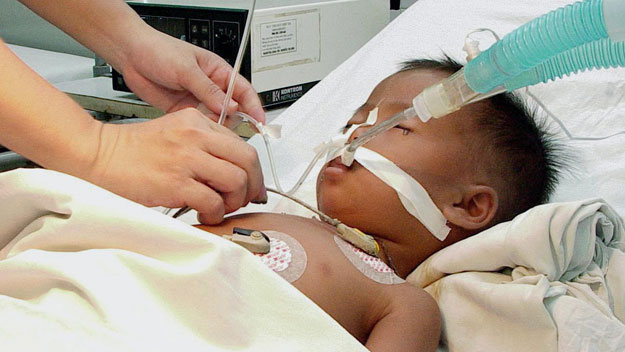More than 100 children with hand, foot and mouth disease were taken to NSW hospitals by worried parents in the latest fortnightly surveillance report.
However, NSW Health says the worst of the deadly enterovirus 71 (EV71) outbreak is likely to be over.
While the number of children being admitted to hospitals with severe neurological complications — meningitis and encephalitis — remains above average, new data reveals a decline during the week up to June 23.
This year, a dangerous strain of EV71, linked to the deaths of four children during the NSW outbreak, is circulating for the first time in Australia.
One of the victims was 19-month-old Molly Mackander, whose heartbreaking story is told in this month’s issue of The Weekly.
In the most recent week of surveillance data, 60 children with hand, foot and mouth disease were taken to hospital (plus 45 in the previous week) and seven were admitted with meningitis or encephalitis (plus nine in the previous week).
Although the figure is relatively high, hand, foot and mouth disease can be caused by various viruses as well as EV71. In most cases, it isn’t serious and children recover without complications.
Meningitis and encephalitis, however, are considered serious and can be fatal. Under-twos are at highest risk from EV71.
NSW Health confirmed it had dropped the frequency of its enhanced enterovirus surveillance system, which was set up to monitor the dangerous new strain of the virus, from weekly to fortnightly reporting.
“Most indicators suggest that NSW has passed the peak of enterovirus activity,” a spokesperson said. “The NSW Ministry of Health has not been notified of any further deaths linked to enterovirus.”
NSW Health could not say how many cases of acute flaccid paralysis — one of the most severe symptoms of EV71 that used to be seen in children worst affected by polio before immunisation — as it was “not routinely notified” of such cases.
However, surveillance data shows the rates of meningitis and encephalitis in children with suspected EV71 were at their highest in January, April and May. The children died in December last year, January, April and last month.
Enterovirus is not a notifiable condition, meaning health authorities do not gather official figures on it except in special circumstances such as the NSW outbreak.
Of the 123 suspected cases since the beginning of the year, 102 have been confirmed as enterovirus infections, with 30 confirmed as EV71. Before April when enhanced surveillance began, more detailed testing to establish the specific strain was not routinely undertaken.
Our online coverage of enterovirus 71 can be found here:




